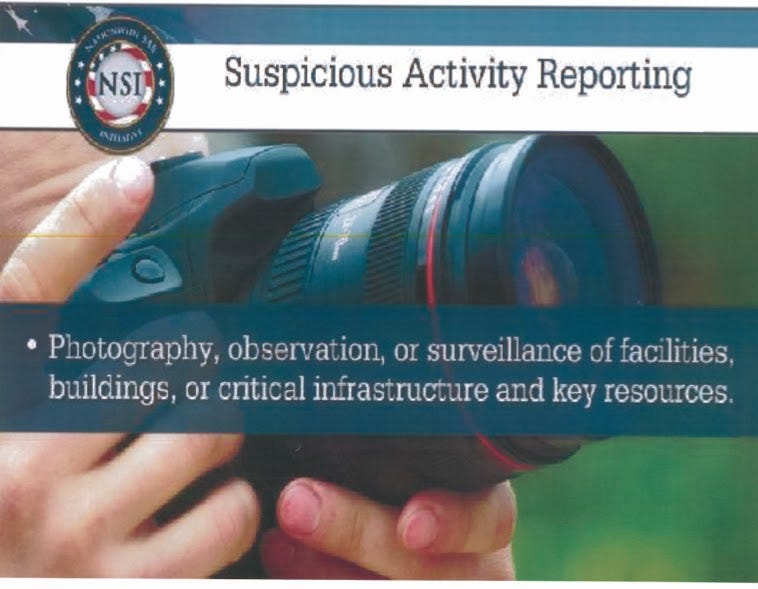Exposed: Police across the country see photographers as potential terrorists

In October 2009, Shawn Nee, an award-winning photographer, was stopped by officers from the County Sheriff’s Department while taking pictures of turnstiles in the L.A. subway. According to the officers, Nee was engaged in “suspicious terrorist activity.”
“I want to know if you are in cahoots with Al-Qaeda to sell these pictures to them for a terrorist purpose,” LASD Deputy told Nee, according to footage shot by a body camera Nee wears while working. Gylfie and his partner, Deputy Roberto Bayes, held Nee’s hands behind his back, searched his pockets and conducted a check to see if there were any outstanding warrants for his arrest. At one point the footage shows Gylfie telling Nee he would put him on “the FBI’s hit list” if he didn’t answer his questions.
“On one level, you’re thinking, is this really happening?” Nee says.
“On another level, you’re thinking, this shouldn’t be happening.”
This sort of encounter, in which local cops harass ordinary citizens engaged in constitutionally protected behavior, has become disturbingly frequent in cities across the United States, largely because federal anti-terrorism funding has made local law enforcement agencies major participants in the “war on terror.” The idea is that cops are particularly well situated to be the eyes and ears that will halt the next attack before it happens. But local police departments often lack the oversight and safeguards that could protect citizens from abuse.
Nee was not arrested or charged back in 2009, and the incident would not have had any legal ramifications if he had not filed a complaint with the LASD arguing that the officers violated his First and Fourth Amendment rights. An internal affairs investigation absolved Gylfie and Bayes of any wrongdoing; indeed, it applauded their actions. The LASD report on the incident calls the officers’ actions “laudable” and praises their “vigilance,” adding that they “are encouraging others to be as proactive.”
Civil libertarians disagree. “Photography is not a crime; it’s artistic expression,” says Peter Bibring, a senior staff attorney with the of Southern who is representing Nee in his lawsuit against the LASD, along with two other photographers who experienced similar encounters. “There was no reason to believe that just because he was taking photographs he was engaged in any kind of criminal or terrorist activity.”
That’s not how Gylfie saw it. The ACLU discovered that Gylfie had submitted a suspicious activity report on Nee with the Los Angeles Joint Regional Intelligence Center, a “fusion center” that collects and shares data between the LASD, the Los Angeles Police Department, the and the FBI. Because Nee’s information was submitted to the fusion center, it was available for the to review and possibly add to its eGuardian database, which compiles terrorism-related information from more than 18,000 law enforcement agencies.
“This raises concerns that people who are engaged not only in lawful activity but in constitutionally protected expression are being added to this database, and we’re not sure what results that may lead to,” Bibring says. “What happens when that individual is stopped for a traffic violation? What happens to that individual when he tries to fly in and out of the country?”
The ACLU obtained Nee’s suspicious activity report, along with reports on more than 100 incidents related to public photography that have been filed by the LASD with the L.A. Joint Regional Intelligence Center. Most of these reports document incidents in which individuals are caught snapping photos of Los Angeles – its buildings, its subways, the skyline.
Why are officers preoccupied with harassing people guilty of nothing more than an interest in the city’s iconography? A 2010 LASD instructor’s guide suggests that they’re just following directions. Used by the department to train officers who patrol transportation hubs in Los Angeles, the guide lists “surveillance indicators” officers should be aware of, including activities as benign as photography with “high-magnification lenses” and taking pictures of railroad tracks, bus terminals and street signs. The guide was developed in part by the U.S. Department of Homeland Security.
“The 9/11 mentality that there are terrorists everywhere has the potential to intrude on everybody’s constitutional rights,” says Laurie Levenson, a professor of criminal law at Loyola Law School and a former federal prosecutor. “And I don’t even think it’s effective law enforcement. You can end up getting so much information that most of it is not useful and you’re missing the needle in the haystack.”
“Eventually everything is going to be suspicious,” Nee says. “And that’s not the world we want to live in.”
http://www.dailystar.com.lb/Opinion/Commentary/2014/Feb-03/246158-anti-terrorism-has-driven-police-abuse.ashx#axzz2sIMbCfkV
A new Google patent suggests automatically sending your videos and photos to law enforcement:
http://phandroid.com/2014/01/29/google-mob-sourced-video-patent/
Another Google 'Mob Source Video' patent automatically sends timestamps and geolocation data to police:
http://publicintelligence.net/google-mob-video-patent/
Sherriff's Deputy fired for threatening to arrest photographer:
Seattle - A sergeant who racked up more than 100 complaints during his tenure with the King County Sheriff's Office has been fired by Sheriff John Urquhart.
Casey Saulet had already been demoted to deputy for violating the department's rules of conduct stemming from a December 2012 altercation with a family who had accidentally driven into an off-limits area of a Seattle bus tunnel.
In that incident, Saulet allegedly threatened to arrest the driver and his pregnant wife and told them he could "take away your daughter," according to the sheriff's office.
Saultet made more headlines after a July confrontation with a local newspaper reporter was caught on tape. On July 30, Stranger reporter Dominic Holden was taking pictures of officers questioning a man on the street when Saulet threatened to arrest him.
http://www.komonews.com/news/local/King-Co-Sheriff-fires-deputy-who-threatened-Stranger-reporter-243418401.html


